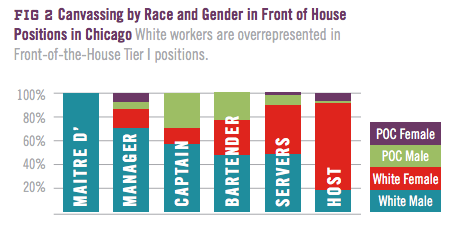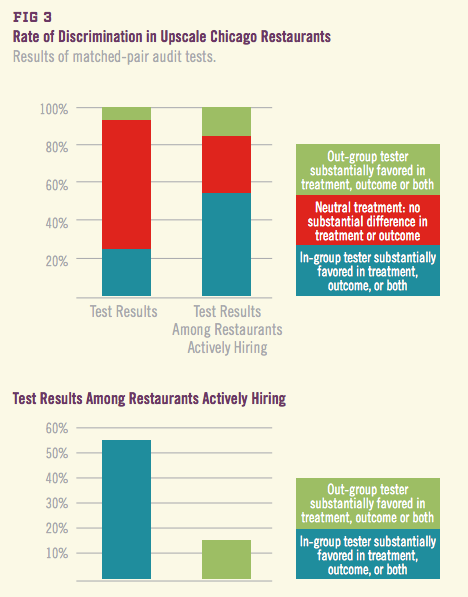Does Fine Dining Discriminate?
By Melissa McEwen in Food on Nov 18, 2014 10:00PM
The Great Service Divide is a report that is sure to make many people uncomfortable. Most people don’t want to think a culture they revere and enjoy being part of is responsible for perpetuating unfair treatment. But the data the uncovered here is disturbing and indicates that fine dining may still have a long way to go in promoting and hiring fairly.
To collect data on the problem, Restaurant Opportunities Centers United employed five different research methods on front of the house “tier one” positions in fine dining - sommeliers, maitre d's, captains, servers and bartenders. These which are some of the highest paid and most prestigious in the restaurant industry. One method was demographic canvassing to sample the current demographics of these positions. Their data showed that in Chicago, these positions were overwhelmingly white and male.

Then they did what is known as matched-pair testing, employing pairs of testers applying simultaneously for job vacancies at 95 fine dining restaurants. The pairs had matching qualifications, but were different races. The tests showed “Testers of color were only 52.59% as likely as white testers to get a job offer, and were less likely than white testers to receive a job interview in the first place.”

The report has recommendations for both restaurants and policy-makers, encouraging restaurants to “Create career ladders in the restaurant industry that provide opportunity for people of color, immigrants, and women to move into the best paying positions in the industry.” The policy recommendations include funding programs like ROC’s own COLORS Hospitality for Workers which provides job skills training. It also recommends increasing the minimum wage and unionization, which is unlikely to make it popular with industry groups. It is also a bit disappointing that they opted not to put it through the peer review process and have it published in a journal, however the economists who did the study have published similar research with similar results before in journals. Also, the matched pair experiments are harder to interpret in an industry like fine dining where personal social networks are so important in hiring, a practice the report criticizes because it may exclude many qualified people from opportunities. Either way you feel, it’s worth reading and available for free online.
